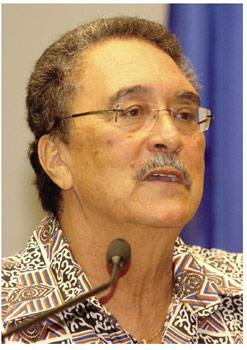
 “The Caribbean has been stalled at a crossroads of indecision,” said Prime Minister of St Lucia, Kenny Anthony. “The old assumptions are out of synch with reality.” “The Caribbean has been stalled at a crossroads of indecision,” said Prime Minister of St Lucia, Kenny Anthony. “The old assumptions are out of synch with reality.”
Prime Minister Anthony made these statements at The UWI St Augustine’s CARICOM Leaders’ Lecture Series. Since the launch of the series in October 2013, four Caribbean leaders have grappled with the regional institution, its legacy, its future, and the on-going quest for integration. The St Lucian PM delivered his address on March 3 at the Daaga Auditorium.
Indeed, it was an environment well-suited to the occasion for, in the words of UWI Principal Clement Sankat, The UWI is one of the older, well-established advocates of Caribbean unity and regional integration.
Yet unity and integration seem more distant than ever as the region is confronted with a worsening economic future. Speaking on the theme, Delivered or Denied? The Dividends of Integration, Dr Anthony highlighted the Caribbean’s inability to adapt to a more competitive global market place. He called for a renewal of the integration mission, led by a CARICOM that is more ambitious in its goals and relevant to its people.
Struggling in the face of competition
“At the root of our dilemma is the demise of our commodity sectors, nor has the transition to service-based economies such as tourism made much of a palliative,” Dr Anthony told attendees at the Distinguished Open Lecture. “Virtually all our primary exports have taken a beating on the open market.”
He was quick to assert that the barriers to a buoyant economy are not insurmountable but are handicaps of our own making – products of our own insularity.
Indicating that the region is able to overcome traditional hurdles like scale and domestic market size, he added that we have access to technology and entry into other markets. Banana, he said, was once a million-dollar-a-week enterprise or “Green Gold”.
However, the St Lucian PM pointed out, the Caribbean did not prepare for open markets and with collapsing market protection, we hoped to be given exceptional preference. Instead of expanding production to reach other shores, “we remained insular,” said Dr Anthony. We had decades of industry knowledge but we did not capitalise on this resource.
Prime Minister Anthony highlighted some of the vulnerabilities within regional economies characterised by high levels of external ownership; little emphasis on local equity; and relegated to being industry hosts rather than owners.
“A prevailing condition of low growth, high debt and dwindling investment is our predicament,” he said.
CARICOM must evolve
In his lecture, PM Anthony reflected on the original vision for CARICOM – each member state helping the other nations and the region as a whole to realise their full potential, including providing a high standard of living for Caribbean citizens. Grimly, he noted that “it is more difficult to be magnanimous when one is hungry.”
As such, Dr Anthony advised, “it is vital that the role of CARICOM evolves not only to keep up with the times but to set the pace for the times.”
For him, it is a question of relevance.
The issue of integration is not isolated to West Indies cricket and CARICOM, said Dr Anthony. Rather, “it is a crisis of our societies, our economic systems and our governance”.
According to PM Kenny Anthony, if regional institutions must survive, not only will they have to adapt to global trends but they must also become relevant to the lives of the people of the region – the realities we face on a domestic level in our daily lives.
Time and effort must be dedicated to building democracy, the quality of human interaction and how we earn, he said.
“We must embrace systemic change if we are to effect real transformation and allow our region to survive in a hostile environment,” said Dr Anthony.
For him, there has to be an ideological, psychological and strategic shift. The St Lucian PM said the new generation perceives CARICOM as an archaic institution of rules and regulations, and it must become less of the latter and more of the embodiment of an ideal that transcends particular historical persons and circumstances.
Dr Anthony argued for a radical rethinking of the ideas underpinning CARICOM as a regional organisation.
Our countries are experiencing high debt and high unemployment, and have lost aspects of our economies, he said. CARICOM has failed to see this as an opportunity to reshape the Caribbean as countries and as a region.
“We have been operating in silos, focusing on isolated initiatives,” Dr Anthony said, “but we have to think more in terms of how we can integrate initiatives and organisations and approaches, and really think about how we are affecting people’s lives. We have to be more relevant to people.”
In his lecture, Dr Anthony emphasised that the issues we face are not isolated, they are systemic, and neither are they merely structural as they affect the everyday realities of Caribbean men and women. He said that there is a disconnect between CARICOM and the realities of the region. The economic downturn has provided CARICOM an opportunity to redress its mission by guiding the region’s people through this latest trauma. As such, he stated, if we are prepared to usher in the new transformations, we can yet endure into the future.
|





